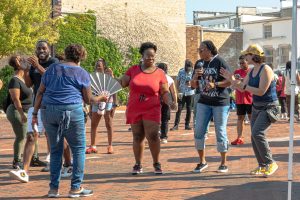Resale shops provide students with music history, experience
March 26, 2014
Besides attending a live concert, resale stores are often a good place to hear music as it was meant to be heard.
In one of these local shops, students who purchase a used item from a resale store might discover more than what they bargained for. In several instances, I find vintage equipment more interesting with hidden treasures, especially with its history.
“There’s a guy who’s in a symphony out of Rockford who took a [instrument] from us the other day,” said Mike Piper co-owner of Northern Thrift, 109 N. Seventh St. “Come to find out, it’s a 1950’s Rocket Trumpet and he’s having it restored right now so he can get it up to playable condition … . But some of the cool stuff that comes inside it was some handwritten music from the lady who owned it previously … . It’s pretty cool the time travel that it would take you on … .”
These small yet fascinating discoveries are becoming a fading emblem in an evolving trend in the music industry. These resale stores are becoming more important for the retaking of high-quality music, especially when an album sacrifices sampling rates when converted from analog to digital.
Sometimes, customers will resell their purchases after they’ve converted the records to digital. Because of this, shop owners are constantly restocking their supply of vinyl records. With enough diligence, music enthusiasts might dig through dusty bargain bins and discover unfamiliar artists that aren’t downloadable from mobile music apps, like Spotify or Pandora. Customers might also find oddities, such as sound tracks from “Star Trek II: The Wrath of Khan” or “Good Morning, Vietnam,” and listen to them in raw analog.
“It’s part of being a collector,” said John Rapp, owner of No Strings Attached, 854 W. Lincoln Highway. “Original is always a better sound than download. You get more for your money, and when the device breaks you have to start all over again.”
Sharing music through mobile devices is efficient but marketed on instant gratification impulses. Last year, Apple’s online iTunes announced its store sold more than 25 billion songs. For roughly the same price as single tracks on iTunes, I can order items at any fast-food restaurant on the dollar menu.
“I was raised to respect an album,” said Ty Johnson, owner of Down the Rabbit Hole, 248 E. Lincoln Highway. “You prized them and you paid attention to them. People don’t now. The thing about playing a record —pulling it out of its sleeve, cleaning it, getting the dust off the needle, putting it on, setting the needle down gingerly, so it doesn’t hurt anything, and then sitting down and listening — is lost. It wasn’t background music.
Now, it’s like everywhere is a sound track for your life and you’re tuning out everything else. But, you’re doing it at lower quality then what we had back then. So, something is lost in this transition.”
Whether you’re looking for a turntable, stereo system or a musical instrument, resale shops offer students the opportunity to listen to music with raw quality.
Free sites that allow donations straight to original artists are a step in the right direction, especially in a computerized age where I believe sharing digital information, including music, should be free.






